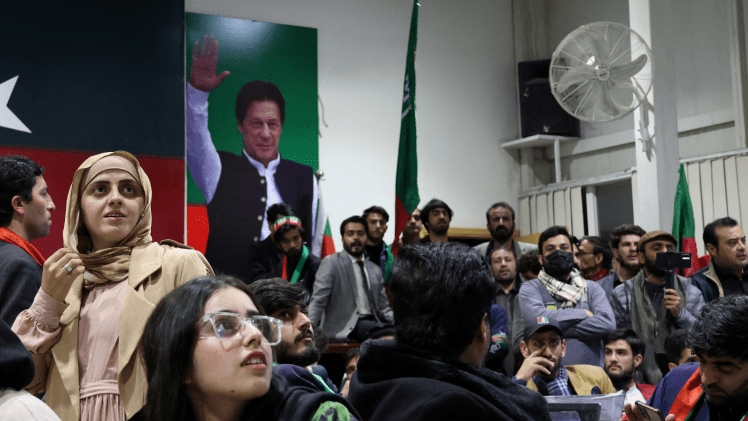Table of Contents
The Pakistan Election Battle
The main battle was between former prime minister Nawaz Sharif’s party and candidates backed by ex-prime minister Imran Khan. Both declared victory separately.
Supporters of jailed former Prime Minister Imran Khan had the edge on Friday in Pakistan’s election results from over 100 seats, after vote counts were hit by unusual delays that the government credited to a suspension of mobile phone services.
Independents, loyal to Khan, had won 47 of 106 seats for which it had results. A total of 265 seats were contested in Thursday’s election.
The Pakistan Peoples Party of Bilawal Bhutto Zardari, the son of assassinated premier Benazir Bhutto, also got 24 while former Prime Minister Nawaz Sharif’s Pakistan Muslim League-Nawaz (PML-N) won 18.
The rest were won by small parties.
Khan is in jail and his Pakistan Tehreek-e-Insaf (PTI) party was barred from the election, so his supporters contested as independents.
Analysts have predicted there may be no clear winner, adding to the woes of a country struggling to recover from an economic crisis while it grapples with rising militant violence in a deeply polarized political environment.
International Pressure
The EU statement noted a “lack of a level playing field”, attributing that to “the inability of some political actors to contest the elections” and to restrictions to freedom of assembly, freedom of expression and internet access
The U.S. State Department said there were “undue restrictions” on freedoms of expressions and assembly while noting violence and attacks on media workers.
Some U.S. lawmakers such as Democratic U.S. Representatives Ro Khanna and Ilhan Omar also expressed concerns, with Khanna saying “the military is interfering and rigging the result.”
Both Khanna and Omar urged the State Department not to recognize a winner until investigations are conducted into allegations of misconduct.
Michael Kugelman, director of the South Asia Institute at the Wilson Center think tank in Washington, said both EU and U.S. State Department statements were “relatively mild … considering the great scale of the rigging that went down.”
Earlier this week, the U.N. human rights office condemned violence against political parties and candidates. It raised concern over the “pattern of harassment, arrests and prolonged detentions of leaders and supporters” of Khan’s party.
The EU, the U.S. and Britain said they would work with the next government and did not congratulate any candidate or party.
British foreign minister David Cameron’s statement noted “serious concerns raised about the fairness and lack of inclusivity of the elections.”
Washington was concerned about “steps that were taken to restrict freedom of expression, specifically around internet and cellphone use,” State Department deputy spokesperson Vedant Patel told reporters.
The U.S. strongly condemned election-related violence both in the run-up to the polls and on election day, Patel added.
United Nations Secretary-General Antonio Guterres also expressed concern about the violence and the suspension of mobile communications services, his spokesperson said in an e-mailed statement.
Amnesty International called the suspension of mobile services “a blunt attack on the rights to freedom of expression and peaceful assembly”.
What this means for the IMF Bailout
If the election does not result in a clear majority for anyone, as analysts are predicting, tackling multiple challenges will be tricky – foremost being seeking a new bailout programme from the International Monetary Fund (IMF) after the current arrangement expires in three weeks.
“The deciding factor is which side the powerful military and its security agencies are on,” said Abbas Nasir, a columnist, commenting on the likelihood that no party would emerge as a clear winner. “Only a huge turnout in favour of (Khan’s) PTI can change its fortunes.”
He added: “Economic challenges are so serious, grave, and the solutions so very painful that I am unsure how anyone who comes to power will steady the ship.”
Thousands of troops were deployed on the streets and at polling stations across the country for the voting on Thursday. Borders with Iran and Afghanistan were temporarily closed as security was stepped up.
Pakistan needs upwards of $22bn to service external debt, make interest payments, and finance its current account for FY24. Reserves, at $3.5bn, are at a critical level, enough to cover barely one month of controlled imports.
Pakistan’s credit rating has suffered due to macroeconomic uncertainty: Three key rating agencies recently cut Pakistan’s ratings – Standard & Poor’s rating for Pakistan stands at CCC+, Moody’s at Caa3 and Fitch at CCC-.
Pakistan needs $22bn to fund its external payment obligations, including international debt servicing, in the financial year 2024, which starts on Saturday, July 1, and ends on June 30, 2024.



